Instagram owner Meta tells Australian teens accounts will close


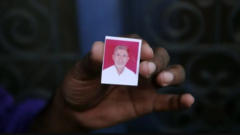

法新社消息称,根据周三(11月19日)公布的官方数据,今年中国重新成为德国第一大贸易伙伴,超过了因贸易战而受影响的美国。
今年1月至9月,中国与德国的贸易往来,也就是进口与出口总和达到1859亿欧元,同比增长0.6%。德国联邦统计局在一份公告中表示,相比之下,同期德美贸易额则下降3.9%,至1847亿欧元。在2016年至2023年间,中国一直是德国的第一大贸易伙伴,直到去年才被美国取代。
今年春季生效的美国关税使德国对美出口大幅下滑近8%,对德国的出口导向型经济模式冲击不小。与此同时,由于中国竞争日益激烈,对华出口也减少了12.3%。
虽然中国是德国的第一大贸易伙伴,但从贸易收支来看,自今年1月以来,德国对华贸易逆差达到647亿欧元,而对美贸易顺差为411亿欧元,美国仍是德国最大的出口市场。
LBBW经济学家延斯-奥利弗·尼克拉施(Jens-Oliver Niklasch)对法新社说:“中国产业在许多领域都有了显著发展,质量方面也在提升。”在他看来,中国如今更被视为“竞争者”而非“贸易伙伴”。ING经济学家卡斯滕·布热斯基(Carsten Brzeski)对法新社指出,这一变化反映出德国对稀土和半导体等中国占据主导地位的关键材料仍“持续的依赖”。
目前正值德国财政部长克林拜尔周三在上海访问之际,这是德国总理默茨政府自5月执政以来首次对中国进行正式访问,在半导体供应紧张、以及欧盟指责中国汽车产业存在不公平竞争的背景下,默茨的政府对中国这全球第二大经济体仍保持谨慎态度。不过为推进中德合作,这位德国财长呼吁“竞争必须公平,并且稀土和原材料的获取必须得到保障”。

法新社消息称,法国商业和工业领域的12家行业联合会携手“大约一百家品牌”周三(11月19日)宣布,将以“不正当竞争”为由起诉 Shein,还要求承认法国本土商家所遭受的经济损害,并就这些损失支付赔偿金。
法国商业委员会(CDCF)及多家行业组织在一份声明中解释称,Shein 的经营模式建立在“无视适用于所有在法国经营企业的法规基础之上”。
除法国商业委员会外,此次行动还得到了代表大型零售业、服装及纺织行业、珠宝业、玩具行业、特许经营以及电商行业等组织的共同参与。声明还称,此次“史无前例的”法律行动还获得了约百家零售企业的加入。各联合会和企业“表达了恢复基于守法前提下的公平竞争的决心”。
Shein 发言人向法新社回应称,这一指控毫无依据,这些参与者选择诉讼对抗,而不是建设性对话。Shein 还补充说:“此次举动更像是一种试图抵制的行为,而不是严肃的法律行动。”
此次诉讼将提交至法国艾克斯-普罗旺斯(罗讷河口省)的商事法庭。正式庭审可能会在“未来12至18个月内”举行。此外,Shein 在爱尔兰的子公司已在当地一家男装品牌 Olly Gan 的清算程序中被以“不正当竞争”之名起诉。

 BBC
BBCGoogle's ultra-private CEO Sundar Pichai is showing me around Googleplex, its California headquarters. A walkway runs along the length of it, passing by a giant dinosaur skeleton, a beach volleyball pitch and dozens of Googlers lunching under the hazy November sun.
But it's a laboratory, hidden away at the back of the campus behind some trees, that he is most excited to show me.
This is where the invention that Google believes is its secret weapon is being developed.
Known as a Tensor Processing Unit (or TPU), it looks like an unassuming little chip but, says Mr Pichai, it will one day power every AI query that goes through Google. This makes it potentially one of the most important objects in the world economy right now.
"AI is the most profound technology humanity [has ever worked] on," he insists. "It has potential for extraordinary benefits - we will have to work through societal disruptions."
But the confusing question lingering over the AI hype is whether it is a bubble at risk of bursting - as, if so, it may well be a spectacular burst akin to the dotcom crash at the start of the century, with consequences for us all.

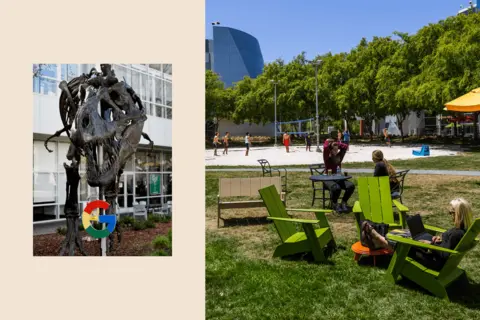 Bloomberg via Getty Images
Bloomberg via Getty ImagesThe Bank of England has already warned of a "sudden correction" in global financial markets, saying "market valuations appear stretched" for tech AI firms. Meanwhile. OpenAI boss Sam Altman has speculated that "there are many parts of AI that I think are kind of bubbly right now".
Asked whether Google would be immune from a potential bubble burst, Mr Pichai said it could weather that potential storm - but for all his starry-eyed excitement around the possibilities of AI, he also issued a warning: "I think no company is going to be immune, including us."
So why, then, is Google investing more than $90bn a year in the AI build-out, a three-fold increase in just four years, at the very moment these suggestions are being discussed?
The AI surge - of which Google is just one part - is, in cash terms, the biggest market boom the world has seen.
Its numbers are extraordinary - there is $15 trillion of market value at Google and four other tech giants whose headquarters are all within a short drive of one another.
Chipmaker turned AI systems pioneer Nvidia in Santa Clara is now worth more than $5 trillion. A 10-minute drive south, in Cupertino, is Apple HQ, hovering around $4 trillion; while 15 minutes west is $1.9 trillion Meta (previously Facebook). And in the centre of San Francisco, OpenAI was recently valued at $500bn.


The purely financial consequences of this trend are significant enough.
The value of the shares in these companies (and a few others outside Silicon Valley, such as Microsoft in Seattle) have helped cushion the US economy from the impact of trade wars, and kept retirement plans and investments buoyant - and not just in the US.
Yet it comes with a big risk. That is, the incredible dependence of US stock market growth on the performance of a handful of tech giants. The Magnificent 7 - Alphabet, Amazon, Apple, Meta, Microsoft, Nvidia, and Tesla - collectively comprise one third of the valuation of America's entire S&P 500.
And that market value is now more highly concentrated in a few firms than it was during the dotcom bubble in 1999, according to the IMF.
Mr Pichai points out that every decade or so come these "inflection points": the personal computer, then the internet in the late 1990s, followed by mobile and cloud. "Now it's clearly the era of Artificial Intelligence."
But as for the big question - is it a bubble?
Mr Pichai argues there are two ways of thinking about it. First, there is "palpably exciting" progress of services that people and companies are using.
But he concedes: "It's also true when we go through these investment cycles, there are moments we overshoot collectively as an industry…
"So I think it's both rational and there are elements of irrationality through a moment like this."

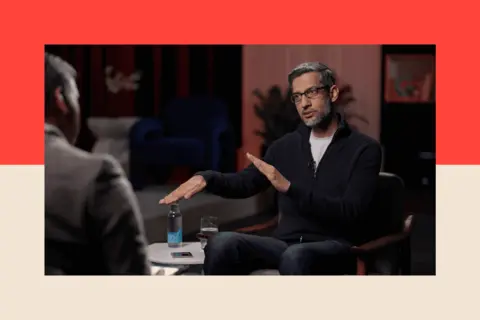
Now, a distinction is emerging in the markets between those businesses that rely on often borrowed money and complicated deals to access the chips that power their AI, and the biggest tech companies, such as Google, Microsoft and Amazon, which can fund investment in chips and data from their own pockets.
Which brings us to Google's own silicon chips, or their prized TPUs.
The lab, where they are tested, is the size of a five-a-side football pitch with a mesh of multi-coloured wires and deep blue blinking lights. Signs all around read: "restricted".
What's striking is the sheer noise - this is down to the cooling systems, which are needed to help control the temperature of the chips, which can get incredibly hot when crunching trillions of calculations.

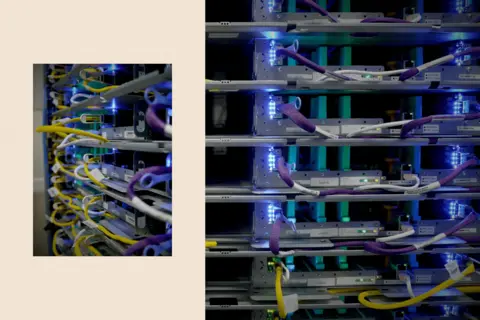
The TPUs are designed to help power AI machines. And they work differently from other types of chips.
The CPU (central processing unit) is the primary component of a computer - essentially its brain - that performs most of the processing and control functions, while GPUs (graphics processing units) perform more specialised processing, executing many parallel tasks at once - this can include AI.
However Asics (application-specific integrated circuits), are chips custom-built for a specific purpose, for example, a specific AI algorithm. And the TPU is a specialist Google-designed type of Asic.

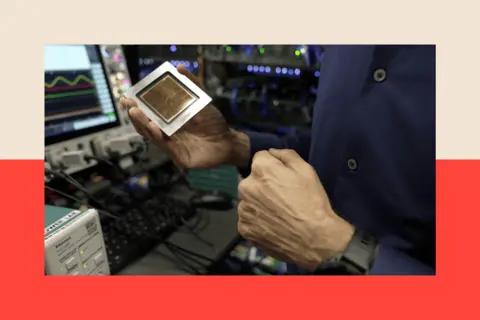
A core aspect of the AI boom has been the mad dash to amass lots of top-performing chips and put them into data centres (or the physical facilities that store, process and run large amounts of data and software).
Nvidia's boss Jensen Huang once coined the term "AI factories" to describe the massive data centres full of pods and racks of super chips, connected to huge energy and cooling systems.
(Tech bosses such as Mark Zuckerberg have referred to some being the size of Manhattan. The Google TPU lab is somewhat more modest, testing out the technology for deployment elsewhere.)
Stories abound of tech bros begging chip makers for hundreds of thousands of these highly engineered pieces of silicon. Take the recent dinner at Nobu in Palo Alto, where Elon Musk and Larry Ellison, the founder and head of Oracle, tried to woo Nvidia's Jensen Huang, to sell them more of them.
As Mr Ellison put it: "I would describe the dinner as me and Elon begging Jensen for GPUs. Please take our money - no, no take more. You're not taking enough. We need you to take more, please!"
It is precisely the race to access the power of as many as possible of these high performance chips, and to scale them up into massive data centres, that is driving an AI boom - and there's a perception that the only way to win is to keep spending.
The terrace of the Rosewood Sand Hill hotel, a sprawling 16-acre estate near the Santa Cruz mountains that serves crab rolls and $35 signature vodka martinis, is where the big Silicon Valley deal-making gets done. It's close to Stanford University and Meta's HQ, as well as the headquarters of major venture capital firms.
There are whispered rumours about who will be next to announce customised AI chips - Asics - to compete with Google and Nvidia.
Just before I visited, something of a storm was brewing about the investment plans of OpenAI, which Elon Musk co-founded.
The firm, which started as a not-for-profit but has since established a commercial structure, has been the focus of a web of cross-investments involving buying up chips and other computer hardware needed for AI processing.
Few in the industry doubt OpenAI's phenomenal user growth - in particular the popularity of its chatbot, ChatGPT. It has ambitions to design its own custom AI chips, but some have speculated about whether it might need government support to achieve this.

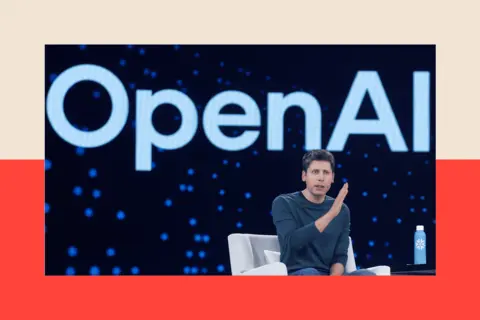 Getty Images
Getty ImagesIn a podcast episode that aired last month, an OpenAI investor questioned how the company's spending commitments tallied with its revenues, to which co-founder Sam Altman shot back, challenging the revenue figures quoted, and adding: "If you want to sell your shares, I'll find you a buyer. Enough."
He has since shared a lengthy post on X, explaining, among other things, that OpenAI is looking at commitments of about $1.4 trillion over the next eight years and why he believes now is the time to invest in scaling up their technology.
"I do not think the government should be writing insurance policies for AI companies," he said.
But he also said: "What we do think might make sense is governments building (and owning) their own AI infrastructure."

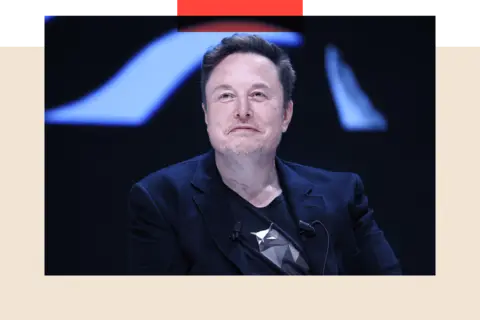 Getty Images
Getty ImagesElsewhere, there have been notable very recent falls in share prices of AI infrastructure companies - Coreweave, a start-up that supplies OpenAI, saw its shares lose 26% of their value earlier this month.
Plus, there have been some reactions in markets for perceived credit risk among other firms. And while most of these tech share prices have generally climbed higher over the course of 2025, there has been a mild dip more generally in the past few days.
None of this has dampened the excitement over AI's potential within the industry. Google's consumer AI model, Gemini 3.0, launched to great fanfare earlier this week — this will pitch Google in a direct battle with OpenAI and its still-dominant ChatGPT for the market share.
What we don't yet know is whether it marks an end to the days of chatbots going rogue and recommending glue as a pizza ingredient. So, is the end result of all this fantastic investment is that information is less reliable, I asked Mr Pichai.
"I think if you only construct systems standalone and you only rely on that, [that] would be true," he told me. "Which is why I think we have to make the information ecosystem has to be much richer than just having AI technology being the sole product in it."
But I put it to him that truth matters. His response: "truth matters".
Nor is the other big question facing tech today dampening the enthusiasm around advancing AI's potential. That is: how on Earth to power it?
By 2030, data centres around the world will use about as much electricity as India did in 2023, according to the IMF. Yet this is also an age where energy supply is under pressure by governments committing to climate change targets.
I put this to Google's Mr Pichai, asking if it is coherent to have ambitions to generate 95% of electricity from low-carbon sources by 2030 - as the UK government does - and also be an AI superpower?
"I think it's possible. But I think for every government, including the UK, it's important to figure out how to scale up infrastructure, including energy infrastructure.
"You don't want to constrain an economy based on energy," he adds. "I think that will have consequences."
Years ago, as a fledgling reporter I cut my teeth in the 2000 dotcom bubble. It followed a famous speech by Federal Reserve Governor Alan Greenspan about "irrational exuberance".
In that time I interviewed Steve Jobs twice, and a few years later questioned Mr Pichai's predecessor Larry Page, and commentated live on the collapse of WorldOfFruit.com.
Through it all, one lesson became clear: that even in the worst-case scenarios and the toughest of crashes, catastrophe isn't guaranteed for all.
Take Amazon - its share price slumped to $6 and its market capitalisation fell to $4bn during that crash, yet some 25 years on Jeff Bezos and his company are very much going strong. Today Amazon is worth $2.4 trillion.
The same would, inevitably, be true of companies shaken by a potential AI bubble burst.

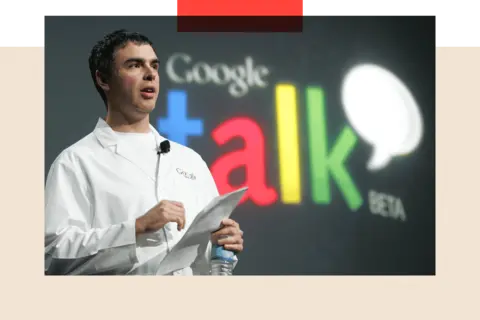 WireImage
WireImagePlus there is another looming factor that may well explain why so many in Silicon Valley - and beyond - are blind to, or perhaps choosing not to, acknowledge this risk, and pushing on regardless.
That is, the attraction of the glittering prize at the end: achieving artificial general intelligence (AGI).
This is the point at which machines match human intelligence, something many believe is within reach. Or beyond that, reaching artificial super-intelligence (ASI), the point at which machines surpass our intelligence.
But I was also told something else that was thought-provoking by a Silicon Valley figure - that it doesn't matter whether there really is a bubble or if it bursts. Step back and what is going on in the bigger picture is a global battle for AI supremacy, with the US against China taking centre stage.
And while Beijing funds these developments centrally, in the US it is a messy but productive free market free for all, which means trial and error on an epic scale.
For now, the US has superiority in silicon over China - companies like Nvidia with their GPUs and Google with their TPUs can afford to accelerate into the storm.
Others will surely fail, and spectacularly so, affecting markets, consumer sentiment and the world economy. The physical footprint left behind, however, containing sheer computing firepower for the deployment of mass AI technologies, will inevitably shape our economy and could well also shape how we work and learn - and who dominates the world for the rest of the 21st Century.


BBC InDepth is the home on the website and app for the best analysis, with fresh perspectives that challenge assumptions and deep reporting on the biggest issues of the day. You can now sign up for notifications that will alert you whenever an InDepth story is published - click here to find out how.

 Facebook
FacebookThe death of an Oasis fan who fell from height at a concert at Wembley Stadium was a "tragic accident", a pre-inquest review has heard.
Lee Claydon, 45, from Bournemouth and known to his family by his middle name Clive, fell from an upper level at the end of the show on 2 August.
At Barnet Coroner's Court, Det Sgt James Raffin, of the Metropolitan Police, told the hearing it was no longer being treated as a criminal case.
"We do not suspect any third party involvement," he said. "This, from everything we have seen, was a tragic accident."
Mr Claydon had been drinking but a toxicology report revealed "no concerns", the officer told the court.
He said the force had also ruled out the possibility of suicide.


Det Sgt Raffin added: "From a police point of view, I would say our investigation is complete."
The officer said he was aware the family had concerns over the "circumstances on the night" and that he would pass these on to officials at Brent Council.
The father of three was pronounced dead at a Wembley medical centre at 22:38 BST, an initial hearing in September was told.
The preliminary cause of death was given as "multiple bodily injuries".
The fall happened during a run of stadium shows for the rock band's sell-out Live '25 reunion tour - their first since splitting in 2009.
Oasis previously said in a statement: "We are shocked and saddened to hear of the tragic death of a fan at the show."
Mr Claydon's father, Clive, paid a tribute to his son, describing him as a "lovely bloke" and a "hard-working family man".
Senior Coroner Andrew Walker said the full inquest would take place on 26 February.

 Getty Images
Getty ImagesWeather warnings for snow and ice have been issued across much of the UK.
Here are some tips for coping with low temperatures.
Babies and young children under five are more at risk in cold weather.
While outside, the NHS advises that babies and children should wear several layers of clothes to keep warm, including a hat and mittens to stop heat loss.
In the car, for safety reasons, you should keep thick jumpers and coats to a minimum, so there is not too much padding between your child and the car seat straps.
If necessary, you can lay a blanket on top of your child once they are safely strapped in.
Remove any hats, gloves and extra layers when you come back inside.
NHS guidance says babies do not need hot rooms at night - a room temperature of between 16-20C (61-68F) is ideal. Overheating is one of the potential causes of sudden infant death syndrome (SIDS).
A sleepsuit and either a sleeping bag or a sheet and/or blanket should be fine.
If you're using a sleeping bag and feel like your baby is cold, you should add an extra layer of clothing - but not extra blankets.
If you are using sheets and/or blankets rather than a sleeping bag, you should use lightweight cellular blankets. Avoid thick, fleecy or padded blankets.

 Getty Images
Getty ImagesCases of flu and norovirus - the winter vomiting bug - typically rise at this time of year, and Covid is still around too.
When it is cold outside, people tend to spend more time indoors, where it can be easier to catch an infection.
For example, coughs and sneezes in an enclosed space with little or no ventilation (windows closed, doors shut) can quickly spread illnesses from person to person.
Opening windows where possible and practising good hygiene - using and then binning a tissue for coughs and sneezes and washing your hands - can help prevent this.
Those who are eligible for the Covid winter booster jab can get it until 31 January 2026. Some groups can also get a free flu vaccine.
Anyone who does not qualify for an NHS vaccine can pay to have either or both jabs privately from a local pharmacy.
Like humans, animals can be at risk of hypothermia if they become too cold.
Veterinary charity PDSA advises giving dogs and cats extra blankets for their beds over the winter months. Raised beds can keep older dogs away from draughts, while cats may like high-up dens.
The charity also recommends extra playtime for pets to make sure they keep active if they are spending less time outside. Indoor toys can help.
Consider keeping cats inside overnight and provide an indoor litter tray.
A sudden drop in temperature can also have a big impact on outside pets, such as rabbits and guinea pigs. They should be given extra bedding for warmth and, if possible, moved to a more sheltered space or even brought inside.
But you should make sure they have enough indoor space to exercise safely.

 Getty Images
Getty ImagesDogs still need walks during cold weather. Usually, their fur will keep them warm.
But the RSPCA advises buying a winter coat or jumper for sick or elderly dogs, or those with thinner fur.
Walk your dog during the day if you can, or consider using LED collars or hi-vis leads if you have to go out in the dark.
Be cautious when letting dogs off the lead in the snow, and supervise them closely as hazards may be hidden. Frozen water may not bear their weight.
If you can, take shorter, more frequent walks rather than one long daily hike.
If your dog gets wet, make sure you dry them off with a towel as soon as you get home and check their paws for salt, grit, dirt or snow.
Drying clothes on radiators is a common practice in the winter.
But it can mean turning on heating in parts of the home you are not using. It may also risk making your home damp, which can cause mould.
One option is to use a dehumidifier, which takes water out of the air. Some have laundry settings and can be run for several hours next to wet clothes on a drying rack.

 Getty Images
Getty ImagesThe financial journalist Martin Lewis has previously pointed out on his BBC podcast that running a dehumidifier is generally "far, far cheaper" than putting on the heating in a room.

 Getty Images
Getty ImagesMany drivers waking up to freezing temperatures have to de-ice their cars.
But motorists are warned not to use boiling water from a kettle - hot water can crack the glass and the water will only freeze again on the screen or on the ground.
Instead, the AA recommends turning on the engine - ensuring the wipers are off to avoid damage - and directing warm air to the windscreen.
You should also turn on your rear windscreen heater, and use air-con if you have it to ensure your windows don't fog up.
The next step is to clear any snow with a soft brush, before using a scraper and liquid de-icer.
Portable heaters can be an alternative to switching on your central heating, but they can pose a serious fire hazard if not used carefully.
Firefighters and safety managers from the Electrical Safety First charity say you should place your heater on a flat surface to ensure it will not fall over.
It should be at least 3ft (1m) away from anything flammable. You should not let curtains, clothes, blankets, duvets or armchairs lean against it.

 Getty Images
Getty ImagesYou should not use your heater to dry your washing, or leave it unattended for long periods of time, or overnight.
Experts also warn against plugging heaters into extension leads, as this could cause a fire.
Leaving electric blankets or heated throws on for too long can also be dangerous, so use the timer function.
You should not use any kind of electric blanket at all if any of the heating wires are visible, there is damage to the power cord or control unit, or it gives off a smell when switched on.
Using gas heaters also carries the risk of carbon monoxide poisoning, so you should ensure you have a working carbon monoxide alarm in the same room.

© Kenny Holston/The New York Times

© Kenny Holston/The New York Times

© Caroline Gutman for The New York Times

© Meron Menghistab for The New York Times
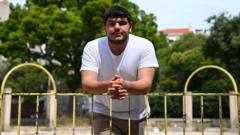
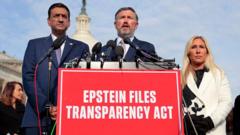

© Peter Dejong/Associated Press

© Jessica Rinaldi/The Boston Globe, via Getty Images

中央社引述南早:“在中国「小红书」上可见到数十名用户透过短片表示,他们所属的党政机关要求他们取消赴日本旅游”。
中央社19日引述香港南华早报的报导,日本首相高市早苗「台湾有事」说引发中日争端持续升级,且未见缓和迹象之际,数名中国国企员工透露,尽管事前已被批准,他们近日纷纷被公司要求取消近期前往日本旅游的计划。
湖北武汉一家国企的工程师向南华早报透露,他在18日接到一通意想不到的电话,来电的是他所属公司的行政部门人员,对方敦促他取消即将到来的赴日本休假行程。
报导提到,这名武汉国企工程师和许多中国国企员工一样,必须获得公司批准才能出国旅行。而他的出国申请早在10月就已获得批准,原定11月底飞往大阪旅游。但随着日中关系日益紧张,他不得不向旅行社取消了整个行程。经过协商,旅行社退还了机票和住宿费用,但签证费没有退。
赴日旅游被取消,这名工程师说,他还在考虑如何利用空出来的假期,可能改去中国其他地方「国内游」。
去程机票和饭店白花了
北京一家公立医院的男护士表示,他在11月初向医院申请到日本旅游。但中国文旅部发布日本的旅游警示后,医院主管昨天便以此为理由,要求他取消原定这个周末出发的日本旅游行程。
这名月薪仅人民币4000余元的男护士说,他是透过国外的线上旅游平台预定赴日机票和饭店,总共花了近6000元人民币,这导致大部分预订都无法退款,只剩下回程机票应该可以退款,去程机票和饭店就白花了,这对他无疑是沉重打击。
他坦承,自己正在考虑未经许可就偷偷去日本,但如果被医院主管发现,就太冒险了。
北京1名国营科研机构员工也表示,他同样面临取消12月日本行的压力,而他在大约1个月前就计划去日本休年假了。他的主管虽然没有明确表示完全不允许他去日本,却搁置了他的出国申请,实际上意味着上级不想让他去日本。
相较于前述的男护士,这名国营科研机构员工比较幸运,因为他预订的机票是提供退款的中国籍航空公司,且经过交涉,日本的饭店也全额退还了他的预订费用。至于空出来的假期,他表示还不确定,可能考虑前往其他目的地,但由于签证问题,这个出国旅游计划很可能要搁置了。
报导提到,这两天,在中国短影音平台「小红书」上可见到数十名用户透过短片表示,他们所属的党政机关要求他们取消赴日本旅游。
高市早苗「台湾有事」说引发中国强烈反弹后,中方以安全疑虑为由,建议公民近期避免前往日本;多家中国大型旅行社随即暂停销售日本旅游行程;而中国航空业者也相继宣布,将为年底前飞往日本的机票提供全额退款。
在日中这场风波爆发前,由于日圆疲软,日本旅游成本越来越低,中国赴日游客人数一直居高不下。

 @zinkevich_igor
@zinkevich_igorNine people have been killed in Russian strikes on Ukraine overnight, Ukraine's president Volodymyr Zelensky has said.
Russia launched more than 470 drones and 47 missiles in the "brazen attack", he wrote in a post on Telegram.
Three districts of Ukraine's second city, Kharkiv, were hit by a massive drone attack which injured more than 30 people, including children. Photos posted online showed buildings and cars ablaze.
Power cuts are affecting a number of regions across the country, Ukraine's energy ministry said.
This breaking news story is being updated and more details will be published shortly. Please refresh the page for the fullest version.
You can receive Breaking News on a smartphone or tablet via the BBC News App. You can also follow @BBCBreaking on X to get the latest alerts.

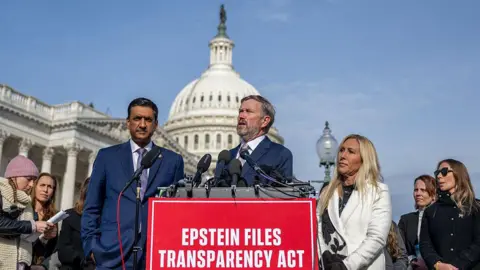 Getty Images
Getty ImagesBoth chambers of Congress agreed to order the US justice department to release its files on sex offender financier Jeffrey Epstein.
The House of Representatives overwhelming approved the measure in a 427-1 vote and the Senate unanimously fast-tracked it without a formal vote.
The moves come just days after President Donald Trump reversed his position and urged Congress to vote to disclose the records following public pushback from many of his supporters.
Last week, Trump and his ties to Epstein were thrust back into the headlines after more than 20,000 pages of documents - some mentioning the president - were released. The White House denied any wrongdoing.
Republican Clay Higgins, of Louisiana, was the sole House objector and cited his concern about “innocent people being hurt” with the release of the information.
Trump’s reversal from attacking those on Capitol Hill who wanted the files released to saying there was “nothing to hide” surprised some in Washington.
The Republican congressional leadership was caught off guard after aligning their message with the president for the past few weeks and opposing the release.
House Speaker Mike Johnson had repeatedly called the push to release the Epstein files a "Democrat hoax".
On Tuesday, he voted in support of release.
The measure had been expected to take a few days to reach the US Senate, but after the resounding afternoon vote in the House, the timeline quickly sped up.
Senate Minority Leader Chuck Schumer brought up the bill on the floor of the Senate under a procedure called unanimous consent. Because no one objected, there was no debate and no amendments added to the bill.
It will head from the Senate to the president‘s desk, where he is expected to sign it into law.
A congressional vote was not required to release the files - Trump could have ordered the release on his own.
The bill requires Attorney General Pam Bondi to release “all unclassified records, documents, communications, and investigative materials” related to Epstein and his co-conspirator Ghislaine Maxwell no later than 30 days after the law is enacted.
Those materials include internal justice department communications, flight logs and people and entities connected to Epstein.
But the bill also gives Bondi the power to withhold information that would jeopardise any active federal investigation or identifies any victims.
Epstein, a financier, was found dead in his New York prison cell in 2019 in what a coroner ruled was a suicide.
He was being held on charges of sex trafficking, having previously been convicted of soliciting prostitution from a minor in 2008.
During two criminal investigations into Epstein, thousands of documents were gathered, including transcripts of interviews with victims and witnesses.
Trump and Epstein previously socialised in similar circles, but the president said he cut ties with Epstein many years ago, before his 2008 conviction. The president also said he was unaware of Epstein’s criminal activity.
Last week, Democrats on the House Oversight Committee published three email chains, including correspondence between Epstein and Maxwell, who is currently serving a 20-year prison sentence for sex trafficking.
Some of those make mention of Trump, including one email, sent in 2011, in which Epstein wrote to Maxwell: “I want you to realize that that dog that hasn’t barked is Trump.. [VICTIM] spent hours at my house with him.”
The White House said last week that the victim referenced in the email was prominent Epstein accuser Virginia Giuffre.
Giuffre, who died in April, has said that she never saw Trump participate in any abuse and there is no implication of any wrongdoing by Trump in the emails.
Trump has consistently denied any wrongdoing in relation to Epstein. White House Press Secretary Karoline Leavitt said the emails were "selectively leaked" by House Democrats to "liberal media to create a fake narrative to smear President Trump".
The push for the release of the investigative files held by the Department of Justice was led by Republican Thomas Massie, a Kentucky congressman who sometimes dissents from his party, and Democrat Ro Khanna, a California congressman, both of whom introduced the legislation.
Massie has faced criticism from Trump for his push to release the files, but has stood firm.
“In 2030, he’s not going to be the president,” Massie said to ABC News over the weekend. He added that fellow Republicans who voted against release "will have voted to protect paedophiles”.
Another Republican who has pushed for the release of the files is House Representative Marjorie Taylor Greene. She had been a staunch supporter of Trump before the two fell out over the issue, with the president now calling her a "traitor".
At a news conference earlier in the day on Tuesday, Greene said she is speaking up on behalf of Epstein's survivors. She also called out Trump directly.
"Let me tell you what a traitor is. A traitor is an American that serves foreign countries and themselves; a patriot is an American that serves the United States of America and Americans like the women standing behind me," Greene said.
She said that row over Epstein has been one of the "most destructive things" to Trump's Make America Great Again movement since his election in 2016.
Survivors of Epstein’s abuse also spoke at the news conference, urging lawmakers to release the files and pushing Trump to do the same.
Epstein survivor Annie Farmer said that keeping the files under wraps amounted to “institutional betrayal”.
“Because these crimes were not properly investigated, so many more girls and women were harmed,” Ms Farmer said.

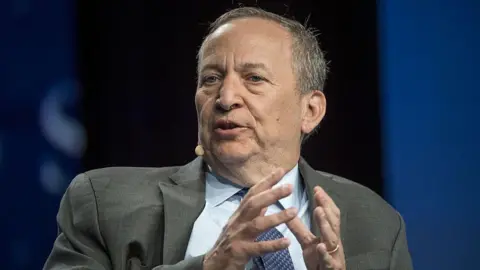 Getty Images
Getty ImagesFormer US treasury secretary Larry Summers is stepping down from the board at OpenAI, a week after a tranche of emails between him and late convicted sex offender Jeffrey Epstein was released.
Summers said in a statement to the BBC that he was "grateful for the opportunity to have served, excited about the potential of the company, and look forward to following their progress".
Summers, who was also once the president of Harvard University, said on Monday that he would be stepping back from public commitments over his ties to Epstein.
The recently released emails showed Summers communicated with Epstein until the day before Epstein's 2019 arrest for the alleged sex trafficking of minors.
In a statement, the artificial intelligence company said it respected Summers' decision to resign.
"We appreciate his many contributions and the perspective he brought to the Board," OpenAI said.
The news comes after both chambers of Congress agreed on Tuesday to pass a measure to require the US justice department to release its files on Epstein.
The measure will then head to the desk of US President Donald Trump for approval. He has said he plans to sign the bill, after reversing his position on the issue following pushback from his supporters.
A batch of Epstein-related emails released by the House Oversight Committee last week mentioned a number of high-profile figures in the financier's former circle, without indicating any legal wrongdoing by those figures.
The emails indicated that Summers and Epstein dined together frequently, with Epstein often trying to connect Summers to prominent global figures.
After the emails were shared with the public, Summers said he took "full responsibility for my misguided decision to continue communicating with Mr Epstein".
He added that he wanted "to rebuild trust and repair relationships with the people closest to me".
Summers held senior posts under two Democratic presidents; serving as treasury secretary under Bill Clinton, and as director of the National Economic Council under Barack Obama.
He led Harvard from 2001 to 2006 and remains a professor there. When announcing his step-down from public commitments earlier on Monday, he said he would continue his teaching commitments.
Following Summers' announcement on Monday, the Center for American Progress, a liberal think tank in Washington where Summers was a senior fellow, confirmed that Summers was no longer affiliated with the organisation.
Summers joined the board of OpenAI, which makes ChatGPT, in 2023 - following a failed attempt to oust its chief executive Sam Altman.

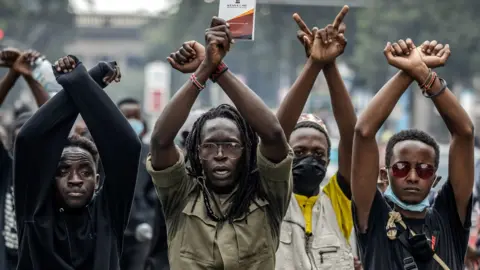 AFP via Getty Images
AFP via Getty ImagesThe Kenyan authorities paid a network of trolls to threaten and intimidate young protesters during recent anti-government demonstrations, Amnesty International has said.
A new report by the human rights organisation said government agencies also employed surveillance and disinformation to target organisers of the mass protests, which swept Kenya across 2024 and 2025.
The demonstrations were driven largely by "Gen Z" activists who used social media platforms to mobilise.
In response to Amnesty's report, Kenya's interior minister said the government "does not sanction harassment or violence against any citizen".
But Amnesty said it had uncovered a campaign to "silence and suppress" the protesters.
Young women and LGBT+ activists were disproportionately targeted, with misogynistic and homophobic comment, as well as AI-generated pornographic images, the report said.
The BBC has approached the government for further comment.
One activist told Amnesty: "I had people coming into my inbox and telling me: 'You will die and leave your kids. We will come and attack you'.
"I even had to change my child's school. Someone sent me my child's name, the age... the school bus number plate. They told me: 'If you continue doing what you're doing then we will take care of this child for you'."
The report features a man who said he was part of a team paid between 25,000 and 50,000 Kenyan shillings (about $190-$390; £145-£300) per day to amplify government messaging and drown out trending protest hashtags on social media platform X.
As well as digital abuse, the authorities have also been accused of carrying out a brutal crackdown on the protests.
More than 100 people died, rights groups say, when police clashed with protesters during two waves of demonstrations - one in 2024 and one in 2025.
The authorities were also accused of arbitrary arrests, enforced disappearances and using lethal force against the protesters.
The government accepted there had been some case of excessive force by police, but also defended the security forces in other instances.
The demonstrations railed against issues such as proposed tax rises, increasing femicide and corruption.
Amnesty chief Agnès Callamard said the organisation's report "clearly demonstrates widespread and coordinated tactics on digital platforms to silence and suppress protests by young activists".
"Our research also proves that these campaigns are driven by state-sponsored trolls, individuals and networks paid to promote pro-government messages and dominate Kenya's daily trends on X," she added.
Kenya's Interior Minister Kipchumba Murkomen said: "The government of Kenya does not sanction harassment, or violence against any citizen... any officer implicated in unlawful conduct bears individual responsibility and is subject to investigation and sanction."
Amnesty also raised concerns about unlawful state surveillance, including allegations - denied by Kenya's largest telecom provider, Safaricom - that authorities used mobile data to monitor protest leaders.

 Getty Images/BBC
Getty Images/BBCGo to BBCAfrica.com for more news from the African continent.
Follow us on Twitter @BBCAfrica, on Facebook at BBC Africa or on Instagram at bbcafrica

 Yonhap News
Yonhap NewsA South Korean passenger ferry carrying 246 passengers and 21 crew has run aground on rocks off the country's south-east coast.
The Queen Jenuvia 2 is stuck on a reef and unable to move, but there is currently no risk of sinking or capsizing, according to the Coast Guard. People are currently being moved to patrol boats, it said.
The accident happened near Jangsan Island in Sinan County on Wednesday evening local time. The vessel ran aground on rocks near the uninhabited island of Jogdo.
Local media reported that five people sustained minor injuries from the impact of the grounding, but there have been no other casualties.
South Korean Prime Minister Kim Min-seok has ordered all available vessels to be mobilised to rescue the ferry.
"We have confirmed that there is currently no flooding. We are transferring passengers to patrol boats and moving them to a safe location," a Coast Guard official said, Chosun Ilbo newspaper reports.
The Coast Guard plans to move the vessel ashore at high tide.
The ferry was travelling to the port city of Mokpo after departing from the resort island of Jeju, carrying 246 passengers and 21 crew members, the Coast Guard.
The area is near the site of the sinking of the Sewol ferry in 2014 that killed more than 300 people, mostly school children heading for a school trip.


© The New York Times

(德国之声中文网)梅尔茨(又译默茨)在结束了短暂的巴西之行回到柏林几天后,出席了一场经济界人士的会议。他在发言时貌似闲谈地讲到,在从巴西返回时他曾问几位随行的德国记者,“你们当中有谁愿意留在这里?——没有一个人举手,”梅尔茨说,“所有人都很高兴,能从我们之前呆的那个地方,在周五夜里踏上返回德国的归途。”他认为德国是“世界上最美的国家之一”。
他所说的“那个地方”就是本次联合国气候峰会的举办地,巴西城市贝伦(Belém)。即便按照巴西的标准,这座位于亚马逊流域的城市也算得上贫穷,有不少破败的房屋、街道和贫民区。
巴西总统卢拉选择在这里举办联合国气候峰会,也是为了让全世界关注亚马逊流域的气候危机,同时凸显这座拥有数百万人口的大都市所面临的严峻社会现实。

傲慢与偏见
德国总理的言辞让卢拉很不以为然,他回应表示,很可惜梅尔茨在贝伦时没有去酒吧,没去跳舞和品尝当地的风味美食,“否则他会发现,若论生活品质,柏林赶不上帕拉州(Pará)和贝伦市的十分之一。”卢拉接着说,所有人都知道,这座城市很贫穷,但是“世界上没有什么地方有如此慷慨好客的人民”。
多家巴西媒体报道了德国总理的这番言论。新闻门户网站“Diário do Centro do Mundo”称梅尔茨做了一个“没羞没臊的比较”。贝伦的市长诺曼多(Igor Normando)也批评梅尔茨的说法“拙劣、傲慢、充满偏见”。
里约热内卢市长帕埃斯(Eduardo Paes)更是在X网站上发帖称,梅尔茨“不如”他在帕拉州的朋友们“那么有礼貌”,并给梅尔茨留言:“希特勒之子!混蛋!纳粹!”他随后删除了该帖子,并改写道:“这是我今天发泄情绪的方式。外交部请保持冷静。巴西和德国的友谊万岁。”
在梅尔茨的Instagram账号的发帖下,有很多人写下“请尊重巴西”之类的留言、并粘贴上大量的巴西国旗。

在野党要求梅尔茨道歉
德国左翼党在联邦议院的气候公正事务发言人博克(Violetta Bock)要求总理道歉。“梅尔茨关于巴西的言论缺乏尊重、居高临下,而且带有偏见。这让德国在国际舞台上颜面尽失。人们会认为,他像特朗普一样,试图转移人们对德国在气候保护方面缺乏承诺的注意力。”
绿色和平组织执行主任马丁·凯泽(Martin Kaiser)对此表示赞同。“梅尔茨必须向贝伦人民道歉,”他说,梅尔茨显然没有时间去体验贝伦人民的热情好客,而贝伦人民正生活在全球气候危机的临界点之一。“总理这样做也冒犯了卢拉总统,世界气候大会正是在卢拉总统的倡议下于贝伦召开的,世界各国可以在这里亲眼目睹热带雨林的壮丽景色和脆弱之处。”
在此背景下,本周仍在巴西参加气候峰会的德国环境部长施耐德(Carsten Schneider)不得不高调表态。他公开称赞贝伦是一座“了不起的城市”。“我在这里看到了高涨的建设热情、友善的人民,但也看到了许多贫困现象。”这位社民党籍的部长表示:“这个地方不仅凸显了热带雨林的重要性,也促使国际社会关注其社会问题、把气候问题和社会问题结合起来思考。”
他重申,德国政府将履行承诺,为气候保护项目继续向巴西提供资金援助。施耐德还在社交媒体发帖称,很遗憾在气候大会日程结束后他不能在贝伦多呆几天。
DW中文有Instagram!欢迎搜寻dw.chinese,看更多深入浅出的图文与影音报道。
© 2025年德国之声版权声明:本文所有内容受到著作权法保护,如无德国之声特别授权,不得擅自使用。任何不当行为都将导致追偿,并受到刑事追究。
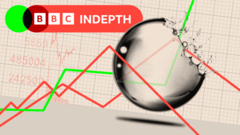

法国斯特拉斯堡美术馆开幕于2025年11月7日到2026年4月27日举行著名动物摄影师文森特·穆尼耶(Vincent Munier)举行题为生命之光(Lumières sur le vivant)艺术展。在巴西举行Cop30之际,人类社会如何负责保护自然和动物之美尤为重要。
艺术与文化助理安妮·米斯特勒(Anne Mistler)表示:“我觉得本次摄影美得令人难以置信,感人至深,充满了诗意和幽默。聚焦于我们平时忽略的事物,我们偶尔也会瞥见某些动物的身影。
穆尼耶的镜头捕捉到了它们,捕捉到了动物展现雄伟气魄的瞬间。这美得令人窒息,同时你也能从他观察自然的方式中感受到他对动物的温柔和爱意。
因为这里不仅有动物,还有壮丽的树木以及周围的环境。
你会想在作品前驻足多时,因为它鼓励人们冥想、反思,并单纯地欣赏美。扪心自问:当我们走出这些房间,走出这些照片之外的地方,我们该如何关注生命,关注生命那丰富多彩的本质?
我认为这对孩子们来说也是一次绝妙的发现,让他们明白尊重生命,尤其是动物的生命,是多么珍贵。因为它不仅有意义,而且还蕴含着美,我们都需要美。”
曾经在西藏与穆尼耶共同拍摄的摄影师勒奥波尔·雅克托(Leopol Jacquot),他表示:“是的我去拍摄了电影《雪豹》和文森特·玛丽以及西尔万·泰松一起。
这显然是一次相当艰难的经历,但也非常令人愉快,我有机会观察到狼,雪豹等。在某种程度上实现了我对野性自然的梦想,非常偏远、非常原始。
从某种意义上说展现美应该激发我们对野生世界、对自然、对自由动物更多的尊重,并让我们意识到,归根结底,我们并非世界的主宰,我们必须为他人留出空间,尊重他人。
参加策划本次展览的斯特拉斯堡美术博物馆助理奥德·玛丽·弗里茨 (Aude Marie Fritz )认为:“本次展览旨在将古代艺术作品无论是来自美术博物馆还是斯特拉斯堡市其他博物馆的藏品与文森特·穆尼耶的摄影作品进行对比。
这种对比让我们意识到这些动物自古以来就存在于艺术作品和艺术家的视野中,同时从穆尼耶的作品中,我们更深刻地意识到这些物种的脆弱性,以及我们为保护这些动物所应承担的责任,不仅是今天更重要的是未来。
最美妙的是看到远方的动物之美,我们也能在更接近我们的动物身上找到这种美。
无论是狐狸、猞猁、猫头鹰,还是北极狼、雪豹,它们如此隐秘,难以捕捉,自然之美无处不在。
看到这些动物,我们自然会产生保护它们的愿望。这提醒我们,我们确实需要采取行动。”

日本首相高市早苗“台湾有事”的言论引发中国当局激烈反应,伴随中国官媒的集体痛骂,北京宣布了一系列对日制裁措施。但据报许多日本商家公开表态支持高市早苗,且不担心其业绩受到中国抵制。
台湾自由时报11月19日报道:日本首相高市早苗「台湾有事」言论,中国政府祭出一连串「禁日令」,从战狼外交官扬言「斩首」,到警告公民勿赴日观光留学、限制水产进口等。面对中国的报复,许多日本商家公开表态支持高市早苗,直言中国抵制行动其实「对业绩影响不大」。
据日媒《RKB每日放送》报导,中国外交部以首相高市早苗提出「台湾有事」言论为由,在14日警告中国公民「近期暂勿前往日本」,预计冲击日本多地的观光旅游业。
根据今年1月至6月的统计资料,前往九州地区的外国旅客总计高达64万人,韩国人以46.8%占最大宗;其次则是中国人,约占21.9%;台湾人以13.1%名列第3。
对于中国政府的最新政策,目前正在日本福冈旅游、来自中国上海的观光客受访指出,虽然他们支持中国政府,但是认为「中国政策跟中国民众没有关系」,并坦言它们其实不太理解、也不想去了解新政策「赴日旅游限制」的准确要求规范。另外,这些中国观光客在镜头前强调,他们还有很多景点想去,之后仍会继续来日本游玩。
在福冈经营服饰兼咖啡厅「加野而青堂」的老板加野敬子指出,她们对中国政府的「旅行限制」采取冷静应对,坦言虽然店内有不少中国游客消费,但仍会尽量维持平静、按照自己的步调工作。日式点心铺「白梅堂」老板桥本芳典则表示,这是国家之间的政策,他对此无能为力,但直言「高市首相很努力了!」,力挺高市政府立场。
桥本芳典补充,虽然游客数量减少,确实会对商家造成影响,但目前正好临近年末,日本顾客的买气此时非常旺,所以他其实不太担心业绩会受到冲击。桥本芳典还提到,秋季是福冈的旅游旺季,因此包含他在内的商家,目前能做的就是把店经营好,努力吸引让日本国内、其他国家的游客愿意上门的消费环境。
博多大丸百货负责人箱崎纯史表示,目前中国政策对百货商场的业绩影响不大,加上11月结束后,日本就会迎接西洋耶诞节、传统跨年与新年的「重要销售时期」,即便来福冈观光的中国游客人数,可能真的受到中国政策影响,但他们认为、也希望这波影响不会持续很久,因此总体来说,对百货业绩影响确实不大。
报导影片吸引大批日本网友关注,并在X(原推特)等社群平台后掀起热烈讨论,「让我们一起去国内旅行吧!」、「老板们发自肺腑的话语让我哭了」、「趁着日本旅游品质提升,我要用钱支持国内店家!」、「冷静不慌张,也不卑微祈求,完全展现出日本人团结一心的气魄」、「身为日本人,我更想去这些商店消费,为维持经济运作贡献一份心力」、「看到国人凭借自身力量,不惧恶势力努力奋斗,怎么能不支持他们」。
自由时报说,台湾网友看到相关报导,则对此感慨,「一个国家的尊严,是人民一起撑出来的」、「大和民族『不愿靠跪着赚钱』的气魄真的让人敬佩」、「换成台湾,就一堆北七在那边哭天喊地活不下去」、「国民党整天靠杯没有陆客,整天想要把台湾变成中国台湾特区」、「如果台湾那些内贼有这种风骨的话,台湾真的真的会超厉害的」、「反观一堆87低能台湾政客、商人跟艺人,跪着舔还不够,还要立法逼全台湾的人一起舔」。